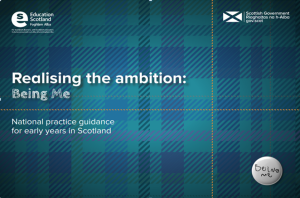Sue Palmer
 ‘When it comes to education’, says this week’s Spectator, ‘Scotland is an example of what not to do’.
‘When it comes to education’, says this week’s Spectator, ‘Scotland is an example of what not to do’.
I didn’t read the article because it was behind a firewall – and anyway, we all know what it’ll say. Not only has our country just had a rotten school report from PISA, but we’ve been on a frightening downward path for a couple of decades. There’s a seemingly intractable ‘poverty-related attainment gap’ and an ever-deepening ‘child and adolescent mental health crisis’. There’s been a terrifying rise in additional support needs (now over a third of Scottish school pupils) but no money to support them. And since COVID, we’ve seen an explosion of behavioural problems and classroom violence.
All this within the context of a cost-of living crisis, with one in four Scottish children already living in poverty. So what on earth should our policy-makers do?
Adjusting the culture
Well, obviously, not more of the same – and almost certainly not what the Spectator suggests… What we really need is a change in the educational culture that got us into this fine mess in the first place. It’s a culture that affects the media, the educational establishment and Scottish policy-makers, and it stems from Scotland’s famous reputation for educational excellence, built on good old Presbyterian values like hard work, self-reliance and academic elitism.
This is not to argue against the importance of hard work – indeed, it’s human nature, given sufficient motivation, to devote great time and energy to a cause – but far too many of our children and young people are no longer motivated to learn. There’s nothing wrong with self-reliance either, except that in a consumer culture it too easily morphs into competitive selfishness, with disastrous consequences for mental health.
 But, in a 21st century school system, there is no place at all for the academic elitism that destroys motivation and undermines mental health. Scotland’s relentless focus on academic ‘attainment’ has ensured that – despite CfE’s enlightened attempt to highlight the four capacities (successful learner, confident individual, effective contributor, responsible citizen) – academic elitism remains our system’s default position.
But, in a 21st century school system, there is no place at all for the academic elitism that destroys motivation and undermines mental health. Scotland’s relentless focus on academic ‘attainment’ has ensured that – despite CfE’s enlightened attempt to highlight the four capacities (successful learner, confident individual, effective contributor, responsible citizen) – academic elitism remains our system’s default position.
So, to pull us back to those four capacities, how about swivelling the spotlight on two important aspects of CfE that current policy-makers always manage to sideline?
The pursuit of happiness
The first is Health and Wellbeing, supposedly up there with Literacy and Numeracy as a ‘Responsibility of All’, underpinning the entire curriculum. According to PISA, Scottish fifteen-year-olds now report the second lowest level of ‘life satisfaction’ in all OECD countries (the lowest is Turkey) so it seems safe to say that we’re neglecting H&W.
Not on paper, of course. When benchmarks were introduced in 2017 to ‘provide clarity on the national standards expected’ there were three sets for H&W, covering 60 pages of government leaflets! However, the benchmark authors advised that ‘there is no need to provide curriculum level judgements in all curriculum areas – stick to Literacy and Numeracy’. As they explained, H&W is just too complicated to assess.
 As an indication of policy-makers’ values. the above example of double-think would be difficult to better. The pursuit of academic data has blinded them to the principles of CfE. They clearly don’t think ‘Responsibility for All’ includes themselves.
As an indication of policy-makers’ values. the above example of double-think would be difficult to better. The pursuit of academic data has blinded them to the principles of CfE. They clearly don’t think ‘Responsibility for All’ includes themselves.
So how about our policy-makers signing up to UNESCO’s global ‘Happy Schools’ project? This promises to support them in re-imagining ‘education systems from the happiness lens, considering the people, processes, places, and principles that make going to school a happy and productive experience for all’.
It’s a long shot but somehow we have to convince the folk who run the show that H&W is not an add-on. Wellbeing and effective learning go hand in hand.
Sound foundations
The second neglected aspect of CfE is early child development (Well, of course it is – this is an Upstart blog!). CfE begins with an Early Level for children between the ages of 3 and 6, based on developmental principles. This is because, as UNESCO explains, education and care during early childhood should ‘aim at the development of a child’s social, emotional, physical and cognitive needs to build a broad and solid foundation for lifelong wellbeing and learning’.
However, due to our cultural attachment to a ridiculously early start on formal schooling, the Early Level was never properly implemented. This problem was exacerbated by the introduction in 2017 of literacy and numeracy benchmarks for Early Level, and in 2018 of SNSA (Scottish National Standardised Assessments of literacy and numeracy) starting in P1.
 In 202o, Scotland’s early years gurus produced excellent (and highly accessible) practice guidance for Early Level: Realising the Ambition. But there’s no way this can be implemented as long as the SNSA and benchmarks are there.
In 202o, Scotland’s early years gurus produced excellent (and highly accessible) practice guidance for Early Level: Realising the Ambition. But there’s no way this can be implemented as long as the SNSA and benchmarks are there.
At the very least Scotland should immediately drop the P1 SNSA/benchmarks and turn Realising The Ambition into statutory guidance. But to make lasting change to the culture, we should introduce a relationship-centred, play-based kindergarten stage for children between 3 and 7. Until our policy-makers take early years seriously and get it right, the rest of the process will be built on sand.

